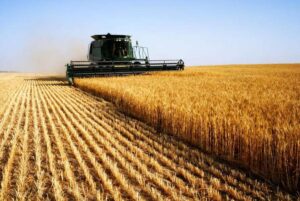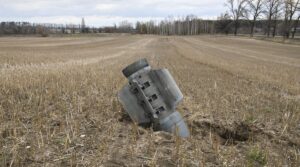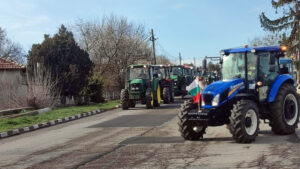
Ukrainian farmers have already harvested 34 million tons of grain, Prime Minister Denys Shmyhal said.
“The harvest is underway. As of today, 34 million tons of grain have been harvested. In particular, 22 million tons of wheat,” Shmyhal said at a government meeting on Friday.
According to the prime minister, the domestic demand is about 6-7 million tons per year, so Ukraine feels quite confident in food security.
“We continue to work on expanding our export potential. It is important for our economy and important for global food security,” he added.

The Victory Harvest Charitable Foundation will receive 10 combine harvesters and five John Deere brand tractors from the foundation of American philanthropist Howard G. Buffett, which will be transferred exclusively for use by Kherson farmers for harvesting and during the next sowing season, the Foundation’s press service has reported.
“Russia’s war against Ukraine has become especially devastating for the people of Kherson region. The flooding of lands caused by the destruction of the Kakhovka dam has now been added to the constant shelling. Our foundation aims to extend support to farmers with these special harvesters and is also working to accelerate demining in the region,” the press service quoted the words of Buffett at a meeting with the head of the Kherson Regional Military Administration during a visit to Kherson region.
The donated John Deere equipment includes five S770 combines, five S760 combines and five 8430 tractors and has an estimated commercial value of more than $5 million.
The Howard G.Buffett Foundation also donated two DOK-ING minesweepers, along with metal detectors, vehicles and other demining equipment, to the State Emergency Service of Ukraine. Thanks to this equipment, more than 20 hectares of land in Kherson region have already been cleared and more than 72 explosive items objects have been removed.
This donation to the Foundation is the addition to agricultural equipment previously donated to the Victory Harvest Foundation with a total value of more than $27 million.

The war in Ukraine and its economic consequences have caused significant damage to the production and income of small farmers, which exceeded USD3.85 billion, according to a report by the UN Food and Agriculture Organization (FAO) published Monday.
“The data from this assessment will help FAO, the Ukrainian government and its partners to identify the urgent needs and geographic areas for investment and support to smallholder farmers, so that they can meet the challenges of the current situation and resume their activities quickly,” said Pierre Vauthier, Head of FAO’s office in Ukraine.
In a nationwide survey 1927 smallholders, who specialize in crop and livestock production, have a land area of up to 250 hectares and are located in 23 regions, including parts of Donetsk, Kharkiv, Kherson and Zaporizhzhia regions under the control of Ukraine, participated in the FAO survey.
Among the key factors that led to the suspension and/or reduction of farms, the FAO cited temporary cessation of activities, loss of control over farmland, death of owners and land sales caused by or related to the escalation of war.
According to the survey, the number of small producers in Ukraine has decreased by almost 80%, of which 1% are livestock producers who stopped producing small amounts of crops, and almost 7% are crop producers who stopped their production completely.
The FAO estimated the total amount of losses and losses for smallholders at USD 3.85 billion in the crop and livestock sectors.
According to the FAO, about 12% of small farms reported that some of their land was potentially contaminated by unexploded ordnance. Frontline areas were most affected, with 32% of respondents confirming this information.
Almost 90% of small crop producers reported a decrease in income, with more than 70% of them recording significant and 25% sharp declines. Small livestock producers were less affected, but more than 60% of them reported a decrease in income, with 46% citing it as significant or drastic.
According to the survey, small farmers have increased their debts compared to the same period before the war, from 6% in 2021 to 9% in 2022.
The FAO noted increased problems due to disruptions in agri-food value chains. On average, 9% of respondents reported that resellers had stopped their operations or were unable to procure more produce.
Most producers surveyed cited difficulty accessing agricultural inputs due to high prices, lack of workers, lack of fuel or electricity to power farm machinery, or even lack of access to electricity. In addition, there is a collapse of markets for agricultural resources (fertilizers and seeds), particularly in frontline areas.
According to the FAO, the greatest needs reported by respondents for continued production are provision of fertilizer, fuel and seeds, access to feed or forage, restocking of livestock and access to markets.
The FAO used an adapted methodology for assessing agricultural losses and damages. The survey was assisted by the Kyiv School of Economics, the All-Ukrainian Association of Rural, Village Councils and United Communities, the East Ukraine Agricultural Advisory Service for the survey in Donetsk Oblast, and the Office of Prospective Development for the survey in Zaporizhzhia Oblast.

Farmers in Romania and Bulgaria staged protests on Friday against the European Union’s decision to exempt agricultural products from Ukraine, which has oversupplied local markets and contributed to lower prices, the Associated Press (AP) reported on Friday.
“Farmers in Romania and Bulgaria organized protests on Friday over the European Union’s stance on excessive supplies of Ukrainian agricultural products that have flooded local markets and weakened prices,” AP reports.
Protests were held in Bucharest and other cities in Romania. In Bulgaria, farmers blocked several border crossings.
“There are less than three months left before the new harvest and there is a danger that the products will not be able to be sold above the production price,” AP quoted Liliana Peron, executive director of the Romanian Farmers Association, as saying.
In recent weeks, Polish farmers have also been protesting against the EU’s duty-free supplies of Ukrainian grain to European markets, forcing the country’s Agriculture Minister Henryk Kowalczyk to resign.
Last year, the EU abolished customs tariffs for Ukraine to allow for freer grain supplies.
On Monday, the European Commission announced its desire to help the population of Ukraine by organizing the export of Ukrainian grain, but it is making sure that the EU market does not suffer too much from Kyiv’s support measures.

Farmers in Romania and Bulgaria staged protests Friday against the European Union’s decision to exempt agricultural products from Ukraine from duties, which ended up oversaturating local markets and contributing to lower prices, the Associated Press (AP) reported Friday.
“Farmers in Romania and Bulgaria staged protests Friday over the European Union’s stance on excessive supplies of Ukrainian agricultural products that have flooded local markets and weakened prices,” AP reported.
Protests took place in Bucharest and other Romanian cities. In Bulgaria, farmers blocked several border points.
“The new harvest is less than three months away and there is a danger that produce cannot be sold above the production price,” AP quoted Liliana Peron, executive director of the Romanian Farmers’ Association, as saying.
Polish farmers have also protested in recent weeks over duty-free supplies of Ukrainian grain to European markets adopted by the EU, forcing the country’s Agriculture Minister Henrik Kowalczyk to resign.
Last year, the EU abolished customs tariffs for Ukraine for freer grain shipments.
On Monday, the European Commission said it wanted to help the Ukrainian population by organizing the export of Ukrainian grain, but it is making sure that the EU market is not hit too hard by Kiev’s support measures.

Over the past week, farmers sowed 210.3 thou hectares of grains and legumes compared to 66.6 thou hectares a week earlier, with Ternopil region leading the way with 47.2 thou hectares, the Ministry of Agrarian Policy reported on Friday.
According to its data, as of March 23, the sowing campaign is already underway in 18 regions of Ukraine, while a week ago it was in 10.
It is noted that since the beginning of this campaign, all categories of farms have sown 293 thousand hectares of grain and leguminous crops, of which 76.1 thousand hectares (26 thousand hectares a week earlier) – spring wheat, 168.1 thousand hectares (44.2 thousand hectares) – spring barley, 35.3 thousand hectares (12 thousand hectares) – peas and 14.2 thousand (0.5 thousand hectares) – oats.
The Ministry clarified that since the beginning of the sowing campaign, farmers in Ternopil region have planted the largest amount of grain and legumes – 67.6 thousand hectares.
Agrarians in Vinnytsia, Volyn, Rivne, Khmelnytsky and Cherkasy regions have started sowing sugar beet, while farmers in Odesa region have started sowing sunflower, the ministry added.
As reported, as of March 25 last year, 150 thousand hectares of agricultural areas were sown in 11 regions, and in 2021, as of the same date, 106 thousand hectares were sown.
As of March 21, 2023, the Ministry of Agrarian Policy forecasted the area under grain and leguminous crops for the 2023 harvest in the territory controlled by Ukraine at 10.24 mln ha, which is 1.41 mln ha or 12.1% less than in 2022.
According to the data and forecasts of the Ministry of Agrarian Policy, winter wheat plantings amounted to 4166 thou hectares (-834 thou hectares y-o-y), winter barley – 536 thou hectares (-255 thou hectares).
The agency expects spring wheat to be planted on 285 thou hectares (+67 thou hectares), spring barley – on 1041 thou hectares (+111 thou hectares), corn – on 3618 thou hectares (-451 thou hectares).